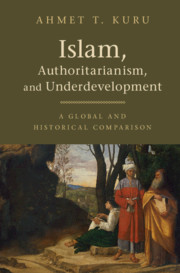Conclusion
from Part II - History
Published online by Cambridge University Press: 18 June 2019
Summary
The Conclusion summarizes the book’s arguments about Muslim and Western countries’ comparative conditions of development and their historical origins. It emphasizes that these countries are similar, at least comparable. It reiterates that neither Islam nor Western colonialism can simply explain the problems of violence, authoritarianism, or socioeconomic underdevelopment in Muslim countries. Thus, both essentialist and post-colonial explanations are unsatisfactory. Instead, the ulema–state alliance, which emerged in the eleventh century and marginalized intellectual and bourgeois classes, has been the main reason for Muslims’ long-lasting problems. At the end, the book recommends that Muslims pursue a political and socioeconomic reform to revive the intellectual and economic dynamism they had in early Islamic history. For such a reform to take place, Muslims need creative intellectuals and an independent bourgeoisie, who can balance the power of the ulema and state authorities.
Information
- Type
- Chapter
- Information
- Islam, Authoritarianism, and UnderdevelopmentA Global and Historical Comparison, pp. 207 - 236Publisher: Cambridge University PressPrint publication year: 2019
